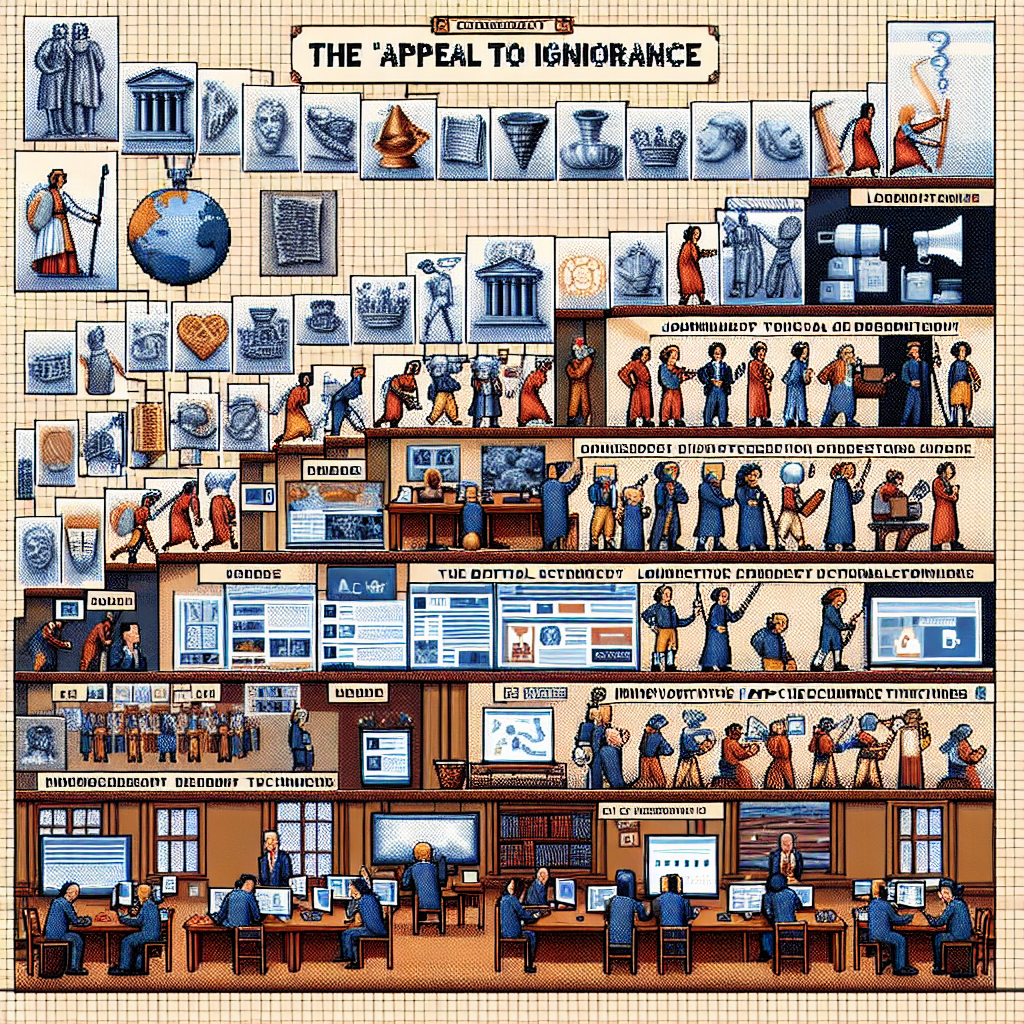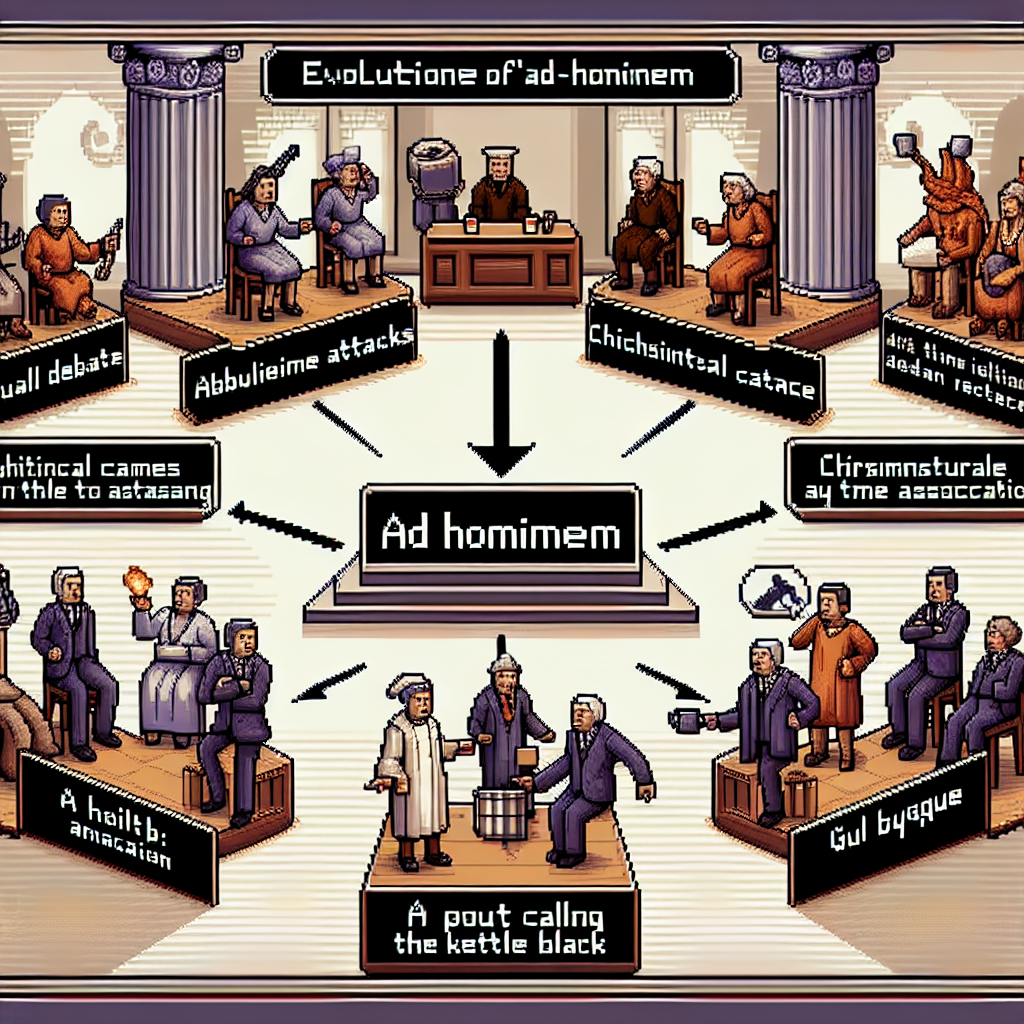Understanding Appeal to Ignorance in News Reporting
Definition of Appeal to Ignorance
The Appeal to Ignorance is a logical fallacy that occurs when it’s argued that a proposition is true simply because it has not been proven false, or vice versa. This fallacy plays a significant role in shaping misunderstandings, especially in news reporting.
Importance of Understanding Logical Fallacies in News Reporting
Recognizing logical fallacies like the Appeal to Ignorance is crucial for maintaining the integrity of news coverage. As journalism builds on facts, relying on fallacies can mislead audiences and skew public perception. During an era where information is rapidly disseminated, being able to identify such fallacies serves as a shield against misinformation. Additionally, when reporters are aware of these pitfalls, they can produce more balanced and factual reporting. Therefore, understanding these logical errors is not just an academic exercise, but a necessary tool for preserving truth in media.
Historical Background of Appeal to Ignorance
Origin of the Appeal to Ignorance
The concept of Appeal to Ignorance has deep roots in philosophical debate, tracing back to the classical era. This logical fallacy assumes that a statement must be true because it has not been proven false, or vice versa. Additionaly, although it might seem straightforward, its insidious nature has allowed it to persist through centuries of discourse.
Notable Examples from History
Throughout history, the Appeal to Ignorance has appeared in various contexts, each time shaping public perception in profound ways. During the Cold War era, politicians often used this fallacy to suggest that the absence of evidence on opponents’ activities was proof of their malicious intentions. Despite skepticism from some quarters, such claims were effective in stirring public fear. Before contemporary media scrutiny became widespread, these fallacies went largely unchallenged, embedding themselves deeper into public consciousness and news coverage.
Mechanism of Appeal to Ignorance
How It Operates in Arguments
The Appeal to Ignorance is a logical fallacy that occurs when a conclusion is based on the absence of evidence rather than the presence of evidence. In practice, this fallacy suggests that because something hasn’t been proven false, it must be true, or vice versa. This flawed reasoning often emerges in debates, weakening the integrity of arguments and misleading audiences. Despite appearing logical, relying on a lack of evidence undermines sound decision-making.
Common Scenarios in News Coverage
In the realm of news reporting, the Appeal to Ignorance can subtly infiltrate stories, particularly when reporters aim to fill information gaps. Due to tight deadlines, journalists might convey uncertainty as evidence, inadvertently influencing public opinion. Furthermore, during unfolding events, the paucity of verified information may tempt news outlets to speculate. Hence, journalists must remain vigilant, ensuring their reporting is rooted in verifiable facts to maintain trust in their storytelling.
Case Studies of Appeal to Ignorance in News Reporting
Recent News Events Involving the Appeal to Ignorance
Recent news events have showcased how the Appeal to Ignorance can shape public perception, especially in the era of rapid digital dissemination. Before delving into specific instances, it is essential to understand the ease with which this fallacy can spread. Often, statements are made asserting a claim is true simply because it hasn’t been disproven. This flaw in logic preys on the lack of immediate evidence, and during news broadcasts, presenters may unwittingly or intentionally exploit this gap in knowledge. Despite efforts to maintain neutrality, the urgency of news cycles compounds the problem by prioritizing speed over accuracy.
Analysis of Impact on Public Opinion
The impact on public opinion is profound because individuals faced with the Appeal to Ignorance often default to either accepting the claim or doubting their own knowledge. Additionally, the absence of counter-evidence is misconstrued as evidence itself. In high-stakes issues, this can lead to misinformed masses, affecting decision-making processes on a societal level. The responsibility falls largely on journalists to rectify this by promoting evidence-based reporting and encouraging skepticism where facts are absent, therefore reducing the fallacy’s influence over the public.
The Appeal to Ignorance in Journalism
Ethical Considerations
Understanding the Appeal to Ignorance is crucial for journalists who aim to maintain ethical standards. By recognizing this fallacy, they can ensure that their reporting does not exploit gaps in knowledge to sway public opinion unjustly.
The Role of Journalists in Mitigating Fallacy Use
Journalists play a pivotal role in combating the Appeal to Ignorance in news reporting. Before publishing, they should rigorously verify facts and clarify assumptions. Despite the pressures of breaking news, they must resist the temptation to fill information gaps with speculative content. Additionally, journalists should actively seek out diverse perspectives to provide a balanced view of events.
During the editing process, it is essential that newsrooms implement practices that highlight logical fallacies, ensuring articles meet high standards of integrity. By doing so, journalists can foster a well-informed public, capable of discerning fact from fallacy, thus strengthening the democratic process.
Strategies for Identifying and Avoiding Appeal to Ignorance
Critical Thinking Skills
The Appeal to Ignorance often influences news consumers, making critical thinking essential. By honing these skills, individuals can better discern fallacious reasoning. Fact-checking sources and questioning evidence are key strategies. Despite the persuasive nature of some arguments, evaluating information based on logic rather than emotion helps counter these fallacies. Before accepting claims as truth, always examine the available evidence.
Best Practices for News Consumers
Additionally, adopting best practices can significantly reduce the influence of the Appeal to Ignorance in news consumption. Diversifying news sources ensures a well-rounded perspective, reducing reliance on single narratives. During news analysis, seeking opinions from experts can provide verifiable insights. Furthermore, developing a habit of analytical reading enhances detection of flawed reasoning. Ethical consumption of news requires vigilance, particularly in an era overflowing with information. By embracing these practices, individuals equip themselves to identify and avoid fallacious appeals effectively.
Case Study: Appeal to Ignorance in the Digital Age
Social Media Amplification
In today’s digital landscape, the Appeal to Ignorance has found fertile ground on social media platforms. These platforms, known for their rapid information dissemination, often reward sensationalism over accuracy. Consequently, before a news story is fully verified, it can spread widely. This has the potential to create a narrative based merely on the absence of evidence to the contrary. Such narratives, because they seem plausible to an uninformed audience, gain traction quickly.
Challenges in the Era of Misinformation
During the COVID-19 pandemic, several unverified claims went viral on social media, underscoring the challenges of misinformation. Despite expert warnings, many users believed unsubstantiated treatments simply because no official source had explicitly refuted them. Additionally, this spread of misinformation complicates public health responses, illustrating the critical need for solutions. Collaborative efforts between social media platforms and fact-checkers can help mitigate the impact by prioritizing verified content and reducing the spread of fallacies like the Appeal to Ignorance.


